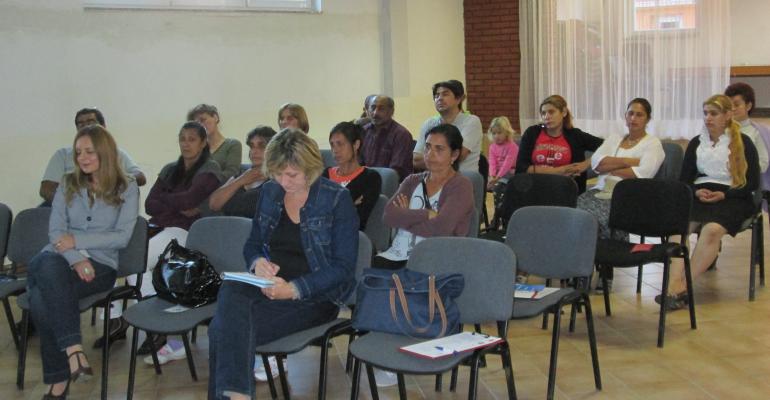Public Discussion “Importance of Education for Access to the Labor Market”
Published: 2014/18/09 10:34

JT SB, 17.09.2014..JPG
On September 17, 2014 IPC had organized a public discussion named “Importance of Education for Access to the Labor Market” that was held in the local community building “Josip Rimac” in Slavonski Brod.
The public discussion was held within the project which has been implemented with the financial support from UNHCR, the Town of Slavonski Brod, Office for Human Rights and Rights of National Minorities, and Ministry of Justice, with the aim of strengthening relations significant for an empowerment of Roma population for use available legal mechanisms in order to achieve and protect their rights.
Guests at the tribune were Irena Cugura Ceric, principal of Elementary school Hugo Badalic; Gordana Alfeldi and Vedrana Palenkic, representatives of the Croatian Employment Service (CES) Slavonski Brod and Dusko Kostic, member of NGO LUNA from Beli Manastir. IPC Legal Adviser Marina Barć-Gačić opened and carried on the public discussion.
20 citizens, members of Roma National Minority attended the public discussion, as well as the local media.
Dusko Kostic established NGO LUNA in 2005 that employed so far over 300 persons (Roma and non-Roma) through the public works. He stated that they succeeded thanks to assistance of the Town Beli Manastir and the CES. The association LUNA fosters the integration of Roma to society, contribute to education of young Roma, encourage them to further education and assist in job-finding.
He revealed the data of cca.150 students of Roma national minority in Baranja and emphasized that the number of females who had opted for the schooling instead of juvenile marriage has been significantly increased. Also, this year four members of Roma national minority are attending faculties but the problem appears when they achieve their diploma since they no longer want to declare as Roma, and that sends a bad image to others in the community.
Besides, for the first time this year, 25 Roma children have been enrolled to the kindergarten in Beli Manastir (last year none) which is a great success.
Irena Cugura-Ceric mentioned that the number of Roma children who are attending elementary school increases every year; last year it was 218, this year 228. However, a small number of Roma children complete elementary education and the major reasons identified by the school officials are the distance from the school, poor material conditions and many family members that results with inadequate conditions for studying, and ignorance of Croatian language.
She also informed that, from this academic year (2014/2015), elementary school Hugo Badalic established an extended stay for the Roma children in order to assist them in writing their homework. Using local employment initiative they hired two Roma assistants to help in the classroom, and they agreed with the Ministry of Education to hold additional classes of Croatian language.
Mrs. Cugura-Ceric invited all parents to encourage their children to continue education because parents' support is of great importance.
Vedrana Palenkic presented her program as advisor for employment in the Croatian Employment Service (CES) pertaining Roma employment, as well as other incentive measures for their employment. CES has also conducting vocational trainings for adults who had already completed secondary school but continue with supplementary education (occupational retraining) so as to be more competitive on the labour market.
The CES works on educational plan every year (which occupations will be financed and stimulated), upon that they announce call for proposals to all interested to submit applications. Thereafter, the CES review applications and select candidates who are eligible for the vocational trainings. Mrs. Palenkic invited all interested to submit their applications at the beginning of the next year when the CES will reveal new educational plan since CES covers all the costs, and it is expected from attendants to complete certain occupation.
Gordana Alfeldi presented the work of the Center for Information and Counselling about Career (CISOK) which is consisted from two areas:
a) professional information – information are provided to the parents and children about which school would be the best match for them based on their grades and abilities
b) professional counselling – children, e.g. to counsel child who would like to enrol to the school that he/she doesn't fulfil conditions in order to redirect them to profession that would meet their interests and abilities
From this year CISOK performs counselling and information as early as the 5th grade of Elementary School.
Furthermore, CISOK intends to counsel and inform children during their high school education with the aim to prepare them better for the labour market. Their employees also assist young people with writing CVs or cover letters.
